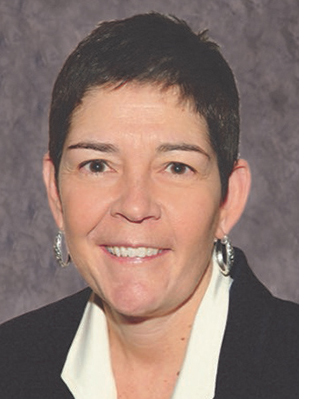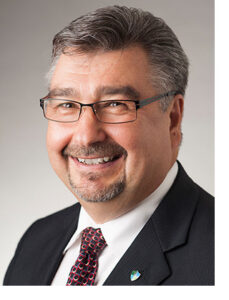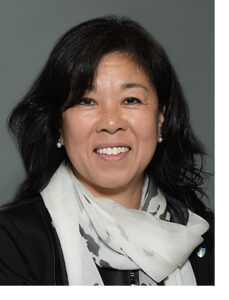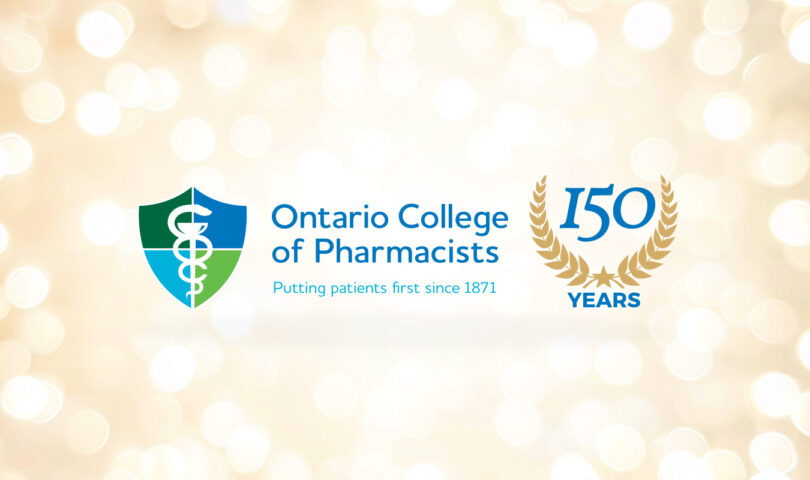This year marks the College’s 150th anniversary, and in celebration of this milestone, this article in Pharmacy Connection highlights some key milestones and initiatives for the College and the pharmacy profession over recent decades.
We asked past and present Registrars William Wensley (1967 to 1990), Jim Dunsdon (1991 to 2000), Deanna Williams (2000 to 2011), Marshall Moleschi (2011 to 2016) and Nancy Lum-Wilson (2017 to present) for their thoughts on some meaningful OCP achievements and milestones during their tenure. Their views provide an opportunity to reflect on the College’s work and mandate to serve and protect the public over the last 150 years.
1967-1990
Registrar: Bill Wensley

- The Ontario government introduced the Ontario Drug Benefit Plan. During this time, pharmacists, encouraged by OCP, the Ontario Pharmacists Association, and other groups, pursued patient-oriented practice and continuing education to ensure they maintain a high level of competence throughout their careers.
- Key issues that were being discussed during this time included child-resistant packaging for prescriptions, ownership of pharmacies and physical standards for dispensaries, training for pharmacists, pharmacy assistants and technicians, the categorization and conditions of sale of non prescription drugs, and the Standards of Practice.
- The inclusion of members of the public on College Council was an important change that introduced new and positive healthcare and administrative perspectives.
- The Report of the Pharmaceutical Inquiry of Ontario, a study commissioned by the Provincial Government, was published. The positive observations in the report about the College and pharmacy practice, including suggestions for improvement, and the model of a self-governing profession acting in the public interest, reflected the wisdom of the Committee on the Healing Arts’ report 20 years earlier. Both of these prestigious reports confirmed and supported the model of a self-governing profession acting in the public interest.
“I’m proud of the College’s and the profession’s work in pursuing patient-oriented practice and continuing education leading up to improving and ensuring levels of competence. This work is an ongoing and integral part of College activities.“
– Bill Wensley
1991-2000
Registrar: Jim Dunsdon

- OCP led the transition to regulation under the new Regulated Health Professions Act, 1991. In addition to increasing public representation on Councils, the new Act also created 16 new health regulatory Colleges.
- OCP requested the government enact legislation prohibiting the sale of tobacco in pharmacies which was achieved through the enactment of the Tobacco Control Act, 1994.
- OCP, in collaboration with L’Ordre des Pharmaciens du Quebec, initiated discussions that resulted in the establishment of the National Association of Pharmacy Regulatory Authorities (NAPRA), which was initially to facilitate harmonization of drug schedules and later, pharmacy practice and competencies across Canada.
- Council passed a motion to explore pursuit of the regulation of pharmacy technicians as a separate and independent class of registrant within the College.
“Leading the College and the profession’s transition to regulation under the new Regulated Health Professions Act, 1991, while also overseeing a massive construction project to double the square footage of the College, were significant initiatives! The College also assumed a leading role in the development of Pharmacy’s first Mutual Recognition Agreement (MRA) which was signed by NAPRA member Colleges in spring, 2000.“
– Jim Dunsdon
2000-2011
Registrar: Deanna Williams

- The government proclaimed legislative and regulatory amendments that granted OCP the final authority to formally regulate Registered Pharmacy Technicians and significantly expanded the scope of practice of pharmacists to include limited powers with respect to prescribing and administration of substances by injection and inhalation.
- The College’s Quality Assurance (QA) Program and Peer Review process, implemented in 1994, was considered cutting edge in Ontario, and was also quickly recognized and widely cited as a model QA program for all regulated professions internationally.
- Council approved a robust public outreach and communication program that in addition to establishing the tagline “Putting Patients First Since 1871,” included animated commercials to inform the public about the existence and role of the College.
- OCP demonstrated its commitment to embracing technology, through enhanced internal IT advances, and through Council’s approvals of regulatory revisions that would enable new technological advances in pharmacy practice, such as internet pharmacies or remote dispensing, provided Council was satisfied that all new provisions included the controls required to ensure public safety and protection
“I am most proud that the Ontario College of Pharmacists gained an international reputation, and recognition, as a leader in professional and occupational regulation, through the following initiatives: OCP’s cutting edge QA program, its bold communication and public outreach efforts, its move from a traditional workplace to a telecommuting platform, and in being the first pharmacy regulator worldwide to formally regulate Pharmacy Technicians as an independent and separate class of registered pharmacy professionals.“
– Deanna Williams
2011-2016
Registrar: Marshall Moleschi

- OCP put in place the framework for the approved profession of Pharmacy Technicians, and developed the frameworks for pharmacist prescribing (adapting, renewing and initiating prescriptions), and pharmacist administration of injections for teaching and for vaccinations.
- OCP adopted standards on Sterile Compounding and developed the legislation, standards and framework for the oversight of hospital pharmacies and drug preparation premises.
- OCP built the infrastructure for improving its operations through continuous quality improvement, project planning, and transparency.
- OCP developed and rolled out a comprehensive Code of Ethics complete with ethical principles and engaging learning tools.
“Over the five years that I had the privilege to serve as registrar of the Ontario College of Pharmacists I saw many significant changes to the profession of pharmacy and the College. While all these changes are significant, the most important changes are not just the changes that focus on ‘what’ one does. The most changes focus ‘how’ one does what they do. I feel the most important change was the development of the Code of Ethics and its tools that dictate a healthcare professional’s ethical duty to patients and society. The Declaration to: put patients first,’ do good,’ do no harm,’ protect patients,’ take ‘responsibility and accountability,’ with ‘integrity and honour.’“
– Marshall Moleschi
2017-Present
Registrar: Nancy Lum-Wilson

- OCP continues to evolve into an organization that better utilizes data and evidence to help guide our work and decisions. The College is constantly looking at how we can better use data and information to more effectively report on the performance of pharmacy and its impact on patient and health system outcomes, as well as our own progress and performance as a regulator. One example is the College’s Assurance and Improvement in Medication Safety (AIMS) Program, designed to reduce the risk of patient harm caused by medication incidents in, or involving, Ontario pharmacies. OCP has developed an interactive tool that allows pharmacy teams and other stakeholders to view aggregate, anonymous medication safety data available through the program.
- OCP has developed quality indicators for community pharmacy that are system- and patient-outcomes focused, and is the first pharmacy regulator in the world that has done so. These quality indicators help the College, pharmacy professionals, and the health system better understand the impact of pharmacy care on patient outcomes and make evidence-informed decisions to improve the quality of pharmacy care in Ontario.
- OCP’s approach to partnership and consultation has strengthened the organization’s impact on the entire healthcare system and drives the College’s mandate to serve and protect the public interest.
- OCP has adopted governance reform that reflects best practices in regulatory governance and strengthens public confidence in our work.
“I think the greatest achievement is the transformation that is currently underway. We are transforming the College into a data-driven and evidence informed organization, using data to better understand our work and the impact that the profession, and we, as a regulator, have on the healthcare system.“
– Nancy Lum-Wilson
A Collaborative Effort to Protect and Serve Patients
While a great deal has changed in the pharmacy profession since 1871, one constant has remained our focus on putting patients first.
Until 1953, the College was both the regulating body for the profession and had responsibility for the education and training of generations of Ontario pharmacists, laying the foundation for the evolution of the profession in the second half of the 20th century and beyond. When the College transferred its teaching functions to the University of Toronto’s Faculty of Pharmacy, it focused its mandate on serving and protecting the public and holding Ontario’s pharmacists, and eventually pharmacy technicians, accountable to the established legislation, standards of practice, code of ethics and policies and guidelines relevant to pharmacy practice. Part of that role includes ensuring that community and hospital pharmacies within the province meet certain standards for operation and are accredited by the College.
This work would not be possible with the dedication and commitment of College staff, leadership, Board and Committee members, government and other stakeholders within the broader healthcare system who have helped develop a regulatory framework here in Ontario that is respected around the world. And, of course, a special thanks is extended to all of the pharmacists and pharmacy technicians who continue to contribute to safe and quality patient care and engage with the College to advance our public interest mandate.
We look forward to ongoing engagement with all of these groups as the College looks forward to embracing exciting new opportunities to promote quality and safety and to continuing to put patients first, together.
The College would like to thank the former Registrars who generously provided their input for this piece, as well as Diana Spizzirri and Deanna Yee for their assistance in preparing this article.













